 Joe Biden uttered the word “Africa” exactly once in his first address to a joint session of Congress, marking the vaunted presidential cliché of his first “100 Days” in office. It was a tangential reference, but its context, implications – and what Biden didn’t say – were somewhat instructive:
Joe Biden uttered the word “Africa” exactly once in his first address to a joint session of Congress, marking the vaunted presidential cliché of his first “100 Days” in office. It was a tangential reference, but its context, implications – and what Biden didn’t say – were somewhat instructive:
“After 20 years of American valor and sacrifice, it’s time to bring our troops home…But make no mistake – the terrorist threat has evolved beyond Afghanistan since 2001 and we will remain vigilant against threats to the United States, wherever they come from. Al Qaeda and ISIS are in Yemen, Syria, Somalia, and other places in Africa and the Middle East and beyond.”
In other words, whereas Mideast locales rate individual country labels, Africa is only referred to as a continental monolith – and, by imputation, only as adjunct to, or setting for, a presumed Islamist threat.
Now that’s not only insensitive and insulting, it’s a myth. At root, African conflicts, grievances, and politics are – just as the platitude goes here in the fancy “First World” – foundationally “local.” These so-called African ISIS franchises Biden spoke of have little to nothing to do with what’s left of IS-Central in Syria and Iraq.
When Washington, and its preferred Paris proxy, ignores that, or makes everything on the continent about – per a politely penned piece by three respected U.S. military men – “Great Power Competition,” well, they do so at their own (and much more so African) peril. Conflicts are catalyzed, authoritarianism accelerated, human rights go to hell-in-a-hand-basket, and the cycle runs on repeat like a skipping (non-) strategy record. Generally, at least in Franco-America’s African adventures, it’s all done so secretly, sleazily, and – because hidden from the pesky public’s peepers – almost silently.
Please Support Our Spring Fund Drive!
Only sometimes the most wretched walking evidences of criminal complicity have a nasty habit of dying on us, and, for a moment the conspirators stand exposed. That’s when the linguistic-apologia indecency starts.
For example, America’s ambassador to the United Nations, Linda Thomas-Greenfield, recently offered an obscene tribute to that one specifically egregious African despot who recently dropped dead – Chadian President Idriss Deby – in her remarks before the UN General Assembly. Consider a few doses of her deplorable highlights:
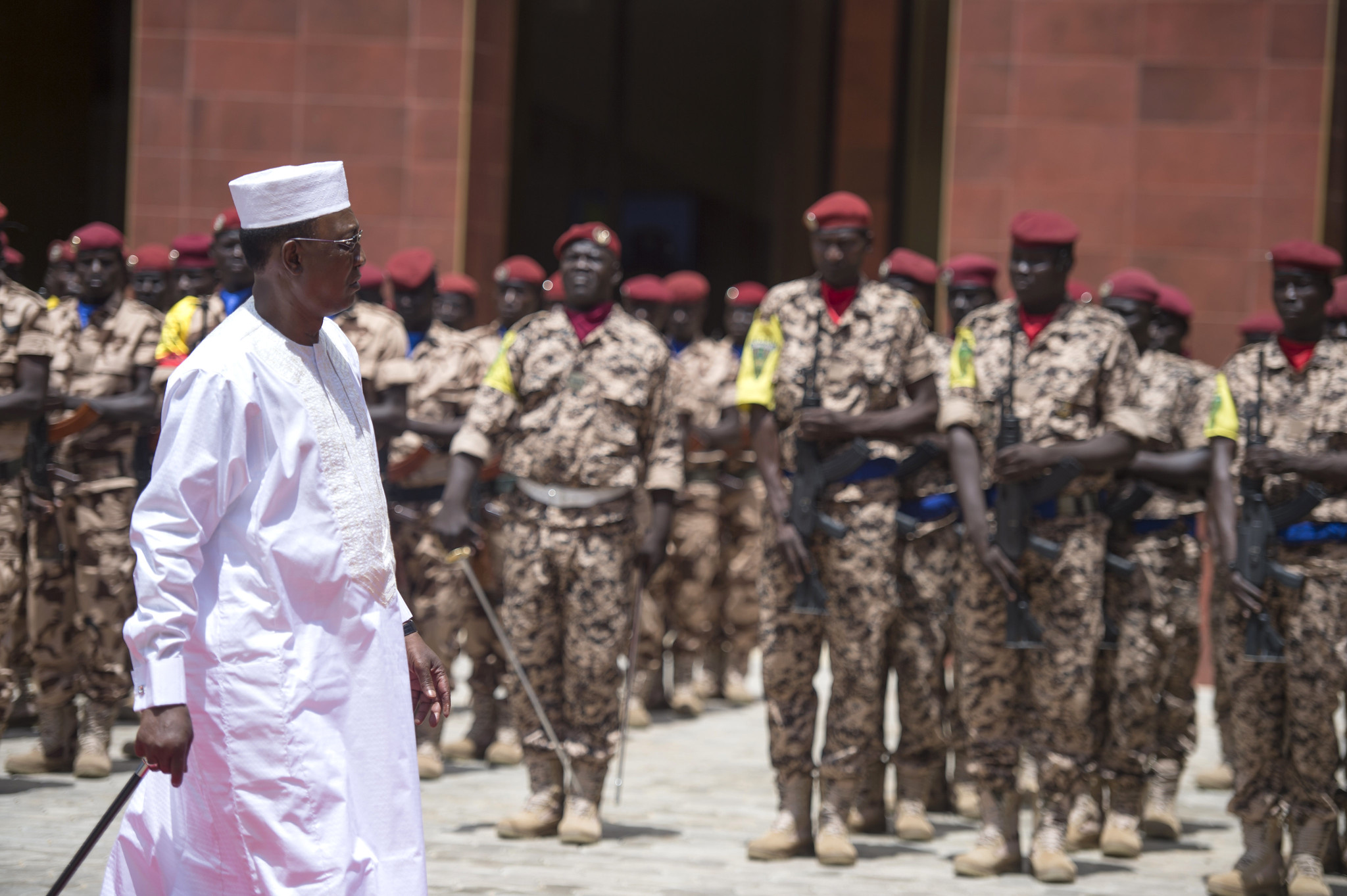
Aug. 8, 2016: Chad’s President Idriss Deby Itno during the swearing in ceremony of his fifth term. (Paul Kagame, Flickr, CC BY-NC-ND 2.0)
[Deby was] a leader and a partner who dedicated his life to the fight against violent extremism…
Most Chadians have never experienced another person in the presidency…[Well, ambassador, that tends to happen when a guy rigs constitutional referendums (plural) to get himself elected six straight times over more than 30 years – and wait, why are you billing that as a positive, anyway?]
Idriss Déby frequently said that he would depart the presidency as he entered it…A military man at his core, Idriss Déby, a warrior, kept his word. [Yes, yes, it seems wholly appropriate for a key representative of the self-styled “greatest democracy in the world” to fetishize the martial values of those who came to power in violent coups!]
A touch over-the-top, such praise for a fellow who murdered opposition figures and their families, conscripted child soldiers, outlawed protests, shut down social media, rigged elections, and so squandered ample oil revenues that while two-thirds of Chadians live on less than $2 a day, his military has consumed as much as 40 percent of the annual national budget…no?
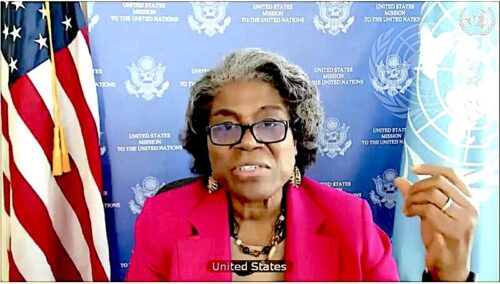
Linda Thomas-Greenfield, U.S. ambassador to the UN, in March. (UN Photo/Evan Schneider)
Well, in Ms. Thomas-Greenfield’s “defense,” Deby did at least generously outsource that army to do Paris’ – and its assist-leading point guard, Washington’s – bidding anywhere, anytime, and at their very beck and call.
Yet here was her real rhetorical rub, and the key to understanding Franco-America’s obtuse, yet calculated, cruelty-enabling crime against Chadians:
His passing is a seismic development for Chad and the entire region.
There it is! See, the Sahel region’s the thing – and fighting the terror Paris and Washington largely created there is their justification to dominate it, exclude and compete with China and Russia, and extract its natural resources, and why we paragons of the West have been enabling African authoritarians and flushing our human-rights histrionics down the hypocrisy tubes for several decades.
Live by the [Libyan] Sword, Die by the Sword
After a time, one almost tires of the ubiquity. Attend to African affairs enough, and it’s hard not to wonder – are there any continental conflicts not either caused, catalyzed, or compounded by the disastrous 2011 U.S.-NATO allied decision to treat Libya to regime-change?
The most enthusiastic proponent for that sovereignty hatchet-job – or in President Muammar Ghadafi’s case, what turned out to be a fatal bayonet-sodomy-job – was none other than France! Which makes sense if one knows just a bit of backstory.
After all, Paris has pursued proxy and traditional war on and in Libya for more than four decades. French planes, and even ground troops, literally fought Ghadafi’s Libyan legions on and off — mostly on towards the end — in Northern Chad from 1978-87.
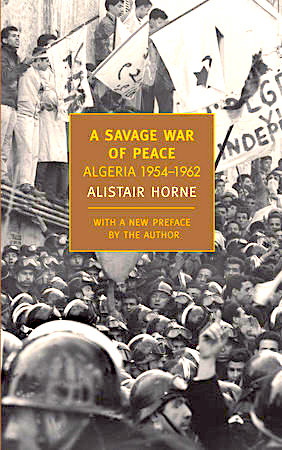 Several dozen French soldiers were killed in combat with Libyans and Libyan-backed rebels during this operation, which — until the ongoing eight-year-running and failing, U.S.-backed, Sahel-wide, “anti-terror” adventure — was Paris’ largest overseas military mission since its tortured 1954-62 “Savage War of Peace” against Algerian independence-seekers. The French lost that wrong-side-of-history battle as well, by the way.
Several dozen French soldiers were killed in combat with Libyans and Libyan-backed rebels during this operation, which — until the ongoing eight-year-running and failing, U.S.-backed, Sahel-wide, “anti-terror” adventure — was Paris’ largest overseas military mission since its tortured 1954-62 “Savage War of Peace” against Algerian independence-seekers. The French lost that wrong-side-of-history battle as well, by the way.
Moreover, should that quip about their current five-country-spanning – but Mali-focused – Sahel operation foundering seem hasty or hyperbolic, recall that it wasn’t a month ago that France’s own Court of Auditors publicly released a report criticizing Paris’ regional civil-military strategy. Specifically, despite doubling its spending (60 percent of which has been military-related) in the G-5 Sahel countries covered – Mali, Niger, Chad, Mauritania, and Burkina Faso – by Operation Barkhane since 2012, and increasing its troop levels by 25 percent, Paris has been unable to stem a region-wide “deterioration of security.” Oh, and where’s the Barkhane mission headquartered?
The Chadian capital of N’Djamena, naturally.
Also, lest we forget, President Ronald Reagan supplemented the earlier French efforts in Chad with a retaliatory bombing (for Ghadafi’s alleged sponsorship of terrorist attacks on U.S. troops stationed in Europe) of Tripoli and Benghazi in 1986 (which killed dozens of civilians, possibly including the Libyan leader’s adopted infant daughter).
Approximately 100 U.S. Air Force and Navy aircraft were involved in the massive, if brief, Operation El Dorado Canyon – one F-111 bomber was even shot down killing two American captains. Reagan, who was described by his ambassador to Chad, John Blane, as having “a thing” about Ghadafi, tapped the CIA to wage a covert war against the Libyans in the country.
Washington also loaded Chad’s government with scores of millions in military aid, thereby empowering perhaps the most mass-murderous modern African strongman, President Hissène Habré, who had some 40,000 people killed during his eight-year reign.
The French just loved the guy too – until they didn’t. When Habré had outlived his anti-Libyan usefulness and became a bit of an embarrassment as the Cold War wound down, Paris dropped him like a bad, and bit embarrassing habit, and backed the rebellion that brought the recently deceased Deby to power.
‘The Friends of Our Friends, Are Killing Our Friends’
Such was French journalist and military commentator Jean-Dominique Merchet’s near perfect summary of Deby’s death in battle against Chadian rebels streaming south from Libya last month.
That’s because the Front for Change and Concord in Chad (F.A.C.T., by its French acronym) rebels who killed Deby — and came close to threatening the capital before being pushed back these past two weeks — are nothing less than a (should be, by now) predictable product of France’s twisted self-sabotaging advanced course in Blowback 101.
The F.A.C.T. fighters “secret,” to (almost) success lay across Chad’s northern border in Libya, where they were trained, seasoned, and armed by the wannabe Deby-like strongman General Khalifa Haftar – for whom these rebels have been serving as soldiers of fortune for years. On that much, UN investigators, regional experts and many Chadian officials agree.
Here’s the kicker, though: France has backed that war criminal and former CIA asset charlatan Haftar for years: providing him intel-reconnaissance flights, clandestine special forces advisors embedded with U.S.-made anti-tank missiles, diplomatic top-cover and plenty of weapons – all in blatant violation of an international arms embargo.
None of it worked of course – Haftar’s offensives all ultimately floundered and settled into an existing tenuous-truce of a stalemate – but it did absolutely implode in France’s meddling faces.
After all, Haftar has other peculiar friends on his insurgent island of misfit toys, including Erik Prince – the now defunct Blackwater private security company’s founder, brother of recent Secretary of Education Betsy DeVos and friend of The Donald – who masterminded a failed plot to raise a band of mercenaries to arm the warlord with U.S.-made attack helicopters and other weapons from U.S.-allied Jordan. The Gulf States (think the very active in Libya, U.A.E.) and Egypt are also supporters of the rogue general’s civil war-accelerating macro-coup attempt. But so is Russia.
That’s right, France — perhaps the alliance’s second most militarily-capable country — is tacitly aligned with NATO’s favorite bad boys in Moscow. That’d be awkward enough, if a February UN report hadn’t noted that F.A.C.T. fighters were based at the same major military air base in central Libya as Russian mercenaries from the Russian Wagner group.
According to reports by researchers —including in French papers — Wagner trainers taught F.A.C.T. forces the rebel combat ropes. Additionally, there are even claims that General Haftar provided the rebels with the 400-450 vehicles they sped into Chad with about four weeks back on their mission to overthrow the Deby government, claiming Deby’s life as their main victory.
Furthermore, Libyan jihadis — some of whom Haftar fights, some of whom he uses — have spilled far more decisively into other parts of the Sahel.
And, while it may be a bit too simplistic to say — as a Ghanian news source recently did — that the “Islamic Jihadist groups [now rebelling in Mali, Burkina Faso, and Niger] were initially formed and funded by the imperialist countries to fight against the former Libyan government…during the counter-revolution of 2011,” it’s undeniable that in, and especially after, toppling Ghadafi, the Franco-U.K.-U.S. coalition became at the very least uncomfortably associated with decidedly Islamist militias. Many later left Libya and infiltrated, or — in the case of Ghadafi’s transnational Tuareg legion of volunteers/mercenaries — returned, to their own corrupt Western-backed countries. The results have been predictable.
Geography as Destiny? Chad at the Eye of a Conflict Storm
Would that shattered and civil/proxy war-torn Libya was Chad’s only neighbor mired in madness. Unfortunately, Chad currently – and traditionally – sits at the spoke of a 360-degree Sahelian conflict wheel. The relationship between Deby’s — and presumably now his anointed successor son’s — regime, and those war- and civil-strife-torn countries is an inverted symbiotic one: each fuels and also feeds the internal instability of the other.
Skipping the well-worn case of Libya to the north, and running clockwise, there’s: Sudan’s Darfur region (where most Chadian rebellions including Deby’s own in 1990 were launched from) that is again being engulfed in hybrid ethno-religious-politico-retaliatory massacres. Darfur’s destabilization, in the form of refugee flows, unsecured safe-havens and transnational rebel-breeding grounds, could make regional life hell – especially in Chad, with which Sudan fought a major proxy war from 2004-10.
To the south, there’s the Franco-Chadian and now anti-Russian proxy playground of the Central African Republic — which has also been wracked with fresh clashes leading to ever more humanitarian crises and plenty more refugees, some streaming into already unstable Chad.
To the capital N’Djamena’s southwest, there’s the ongoing and blood-soaked Boko Haram insurgency around Lake Chad that’s cost the lives of many Chadian civilians and military personnel.
The headquarters for the African Union’s Multi-National Joint Task Force (MNJTF) combating Boko Haram is headquartered in N’Djamena and Nigeria – ground zero for the insurgency – and has expressed genuine concern that Deby’s death may undermine the entire mission.
Last, but not least, to Chad’s northwest, Niger, too, is afflicted with not only the Sahel’s ubiquitous farmer-herder conflicts, but a growing Islamist-inflected insurgency in its southwestern tri-border region with war-torn Burkina Faso and Mali.
‘Just Because You’re Paranoid Doesn’t Mean They Aren’t After You’
Joseph Heller wrote those words in his absurdist novel Catch-22 — a fitting formula for Franco-U.S. foreign policy towards Chad. The famed quote also applies to the countless conspiracy theories developing over the actual details of Deby’s death, specifically the widespread belief that France was somehow in on it.
So far as I can tell, there’s hardly any ironclad evidence that Paris planned, orchestrated, or necessarily even knew about it — and the former general did have an old-school past penchant for personally leading his troops at the front. So Deby may well have been killed in battle, just as the Chadian military officially announced. Nevertheless, count Chadians (and other Africans) less than crazy for smelling some Parisian conspiracy or collusion afoot.
Here again, unsurprisingly, there’s a filthy French track record worth considering that taints their current operations and belies their protests against accusations of neo-colonialism.
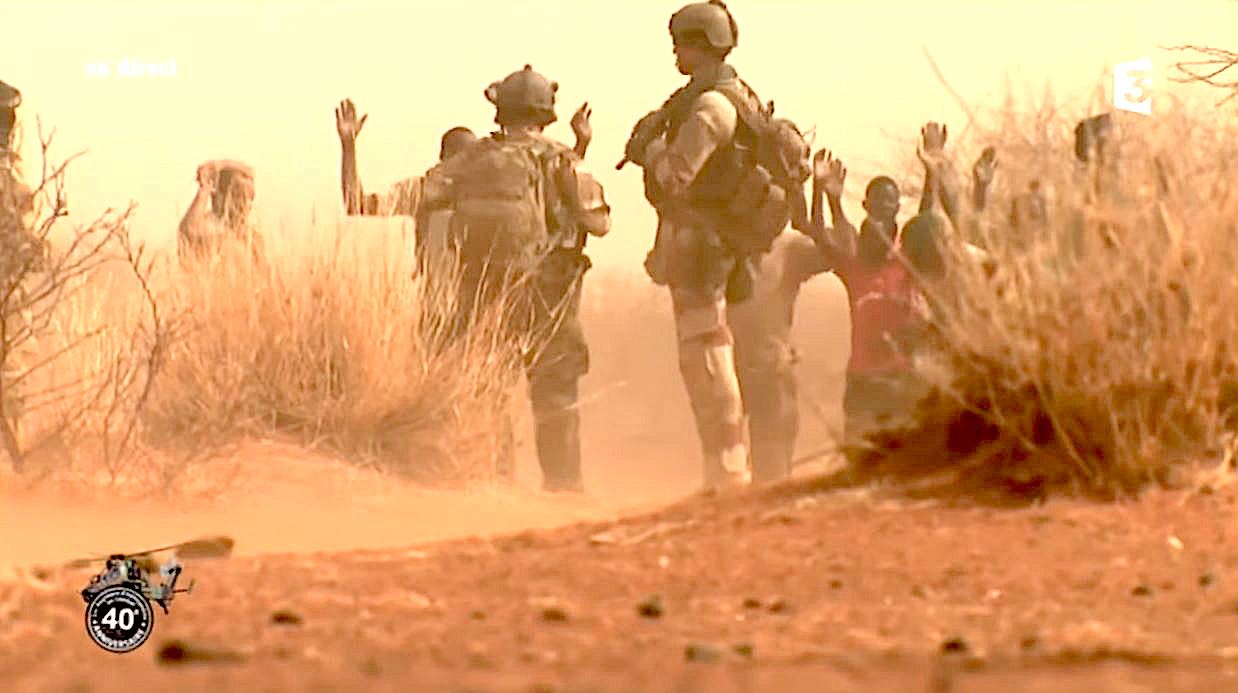
French soldiers inspecting Malian travelers northeast of Gao in June 2017. (France 3 Grand Est, CC BY 3.0, Wikimedia Commons)
Once more, the highlights:
Most of France’s Subsaharan African colonies gained independence in 1960. Only “independence” was probably too strong a word for the sovereignty mirage Paris pressured on these weak, largely synthetic states. The terms, most of which remain in place to one degree or another, of this mostly classified “Colonial Pact” included, but were not limited to:
- Creating and mandating use of the Franc of the Financial Community of Africa, or CFA franc currency, pinned to the French franc (and now the Euro) along with control of huge percentages of the former colonies’ foreign reserves.
- The right to base, freely pass, and intervene with French troops on their sovereign territories.
- Demanding all military equipment be purchased from France.
- Training post-colonial police and army units.
- Requiring French businesses to receive first option for all major government contracts.
- Allowing French corporations to maintain monopoly enterprises in key public service areas.
It is no accident that some 60 percent of the approximately 70 coups that have happened in Africa over the last 50 years occurred in former French colonies. Paris, in fact, has had a direct or indirect hand in more than a few, such as:
- In 1960, the Cameroonian anti-colonial leader Félix-Roland Moumié was assassinated by an agent of the SDECE (French secret service) with thallium poison.
- In 1963, disgruntled ex-French soldiers assassinated Togo’s President Sylvanus Olympio – who just so happened to want his own currency rather than the CFA franc – and Paris may have had knowledge, or been behind, the whole thing.
- In 1966, an ex-French foreign Legionnaire, staged a coup against the president of the Central African Republic.
- In 1968, after Malian President Modiba Keita, decided to leave the CFA zone and abandon other aspects of the Colonial Pact, another African ex-French Foreign Legionnaire overthrew him in a coup.
- In 1975, Chad’s first president was assassinated by soldiers commanded by French Army officers.
- In 1979, in Operation Barracuda, French troops reversed the overthrow of the government in the Central African Republic.
- In 1994, by backing the majoritarian Hutu-chauvinist government of Rwanda – and even having some troops on the ground – Paris, according to a recent report, “enabled” the genocidal massacre of some 800,000 minority ethnic Tutsis.
- In 2002, France deployed some 3,500 “peacekeepers” to strife-torn Côte d’Ivoire, sometimes picked political winners and losers, and, in 2004, even destroyed the Ivorians’ small air force, seized control of the capital, and gunned down civilian protesters.
- In March 2003 (the same month the U.S. orchestrated a decidedly more overt and militant regime change), French and Chadian troops intervened and overthrew the government, installing General François Bozize as president.
- In 2008 and in 2019 France used military force – including unilaterally bombing insurgent convoys in the latter case – to help Deby defeat rebels trying to oust him.
The disturbing fact – unknown to most all Americans, even those seated in Washington throne-rooms – is that a shocking sub-section of French military leaders are nostalgic for such African operations and still subscribe to the paternalistic thinking that informed these actions.
One French journalist recently described the prose, language and veritable institutional culture of many veterans of Paris’s contemporary wars in the Sahel as a “A Barely Repressed Colonial Unconscious.” Furthermore, President Emmanuel Macron – who faces what’s predicted to be a tough reelection campaign in 2022 – feels pressure to secure his right-flank with toughness both in Africa and at home.
That’s what is partly motivating his government’s recently announced plans for new anti-terrorism legislation that would expand strict existing surveillance programs that, per tThe Washington Post, “already test the boundaries of liberal democracy.” France’s privacy advocates are nothing less than livid.
This all unfolds in a country that – after suffering a series of 2015 terrorist attacks – deployed some 10,000 soldiers in its own streets to protect “sensitive” public places, as part of what was dubbed Operation Sentinelle. Worse still, France faces a brewing civil-military crisis, after thousands of former – and perhaps two dozen active – military personnel (including at least 20 retired generals) signed an open letter predicting civil war and threatening a coup if the government doesn’t crack down harder on Islamist extremists and immigrant “hordes.”
Scarier still, the inciters published their proclamation on the 60th anniversary of a failed 1961 military putsch against President Charles de Gaulle, which had aimed to keep Algeria French against all odds and practical battlefield realities. Then there’s this: new opinion polls show that 58 percent of the French people agree with the letter’s basic analysis, and 49 percent would support an army intervention in politics.
Make no mistake: Africa and France’s Sahelian Wars are strongly related to the drama. One of the letter’s central authors, Captain Jean-Pierre Fabre Bernadac, is the 70-year-old son of a soldier in the Spahis Cavalry Regiment of the”Army of Africa” – a common term for portions of France’s military recruited from or typically stationed in North Africa until 1962 – and a Pied-Noir (Algerian-born descendant of French colonists) mother.
Bernadac also served in the Army’s 1st Infantry Regiment before transferring to the Gendarmerie. Other signatories included General Christian Piquemal (former commandant of the famed French Foreign Legion – an outfit all but defined by its legendary African pacification operations); Air Force General Antoine Martinez (another Pied-Noir and post-military founder of a far-right French nationalist group decrying “the Africanization of Europe”); and General Emmanuel de Richoufftz, who served with the parachute infantry in Operation Bonite, a Franco-Belgian intervention to rescue European hostages held by rebels in the Congo, and was later general assistant of the Operation Licorne mission in Ivory Coast.
Even those retired senior officers not affiliated with the coup-threatening letter, including retired U.S. Army General and ex-CIA Director David Petraeus-like uniformed intellectuals such as General Vincent Desportes and Colonel Michel Goya – considered “France’s war philosophers” – are all but obsessed with Africa as the key to French military strategy and national power.
In testimony before the French Senate, Desportes said that while he supported former President Hollande’s intervention against ISIS in Syria and Iraq he would have preferred to instead focus on Africa – where France has a “direct stake.” Colonel Michael Goya commanded marines in the 1998 Operation Cigogne intervention in the Central African Republic, and has also advocated an “Africa First” strategy for Paris.
With such soldiers doing the thinking, advocating, and intimidating, plus Macron’s eyes firmly fixed on doing whatever it takes not to look weak on war in the Sahel before election season, expect more of the same – if more politely justified – in Francophone Africa.
It’s said that the best predictor of future behavior is past behavior. And sure it’s a cliché with its inherent limits. Yet in Paris’ particular case, the platitude likely holds, if for no other reason than much of the French indecency ain’t even past – it’s recent, it’s present, and it’s overtly undertaken unilaterally from the Élysée Palace. Oh, and it hardly hurts when the global American hegemon finances, facilitates, and fires-away its own ordnance, in your failing African adventures.
If I had any advice for Africans from Mauritania to Mozambique, it’d be this: whether it’s French fighter jets, U.S. drones, or their own Western-backed local security forces’ swinging truncheons that are raised above you – take cover.
Danny Sjursen is a retired U.S. Army officer, senior fellow at the Center for International Policy (CIP), contributing editor at Antiwar.com, and director of the new Eisenhower Media Network (EMN). His work has appeared in The New York Times, Los Angeles Times, The Nation, Huff Post, The Hill, Salon, The American Conservative, Mother Jones, Scheer Post and Tom Dispatch, among other publications. He served combat tours in Iraq and Afghanistan and later taught history at West Point. He is the author of a memoir and critical analysis of the Iraq War, Ghostriders of Baghdad: Soldiers, Civilians, and the Myth of the Surge and Patriotic Dissent: America in the Age of Endless War. Along with fellow vet Chris “Henri” Henriksen, he co-hosts the podcast “Fortress on a Hill.” Follow him on Twitter @SkepticalVet and on his website for media requests and past publications.
This article is from AntiWar.com
The views expressed are solely those of the author and may or may not reflect those of Consortium News.
Please Support Our
Spring Fund Drive!

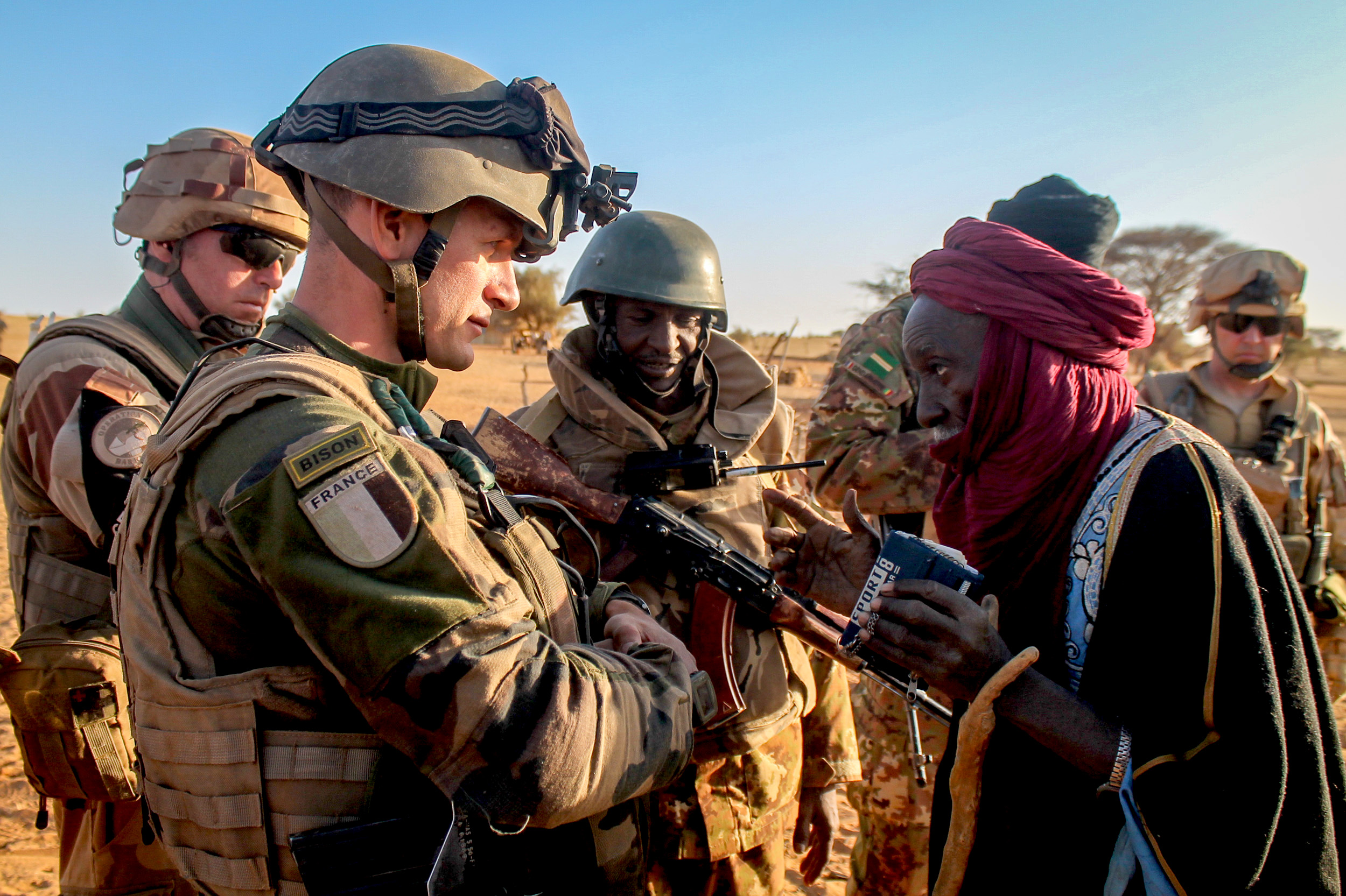

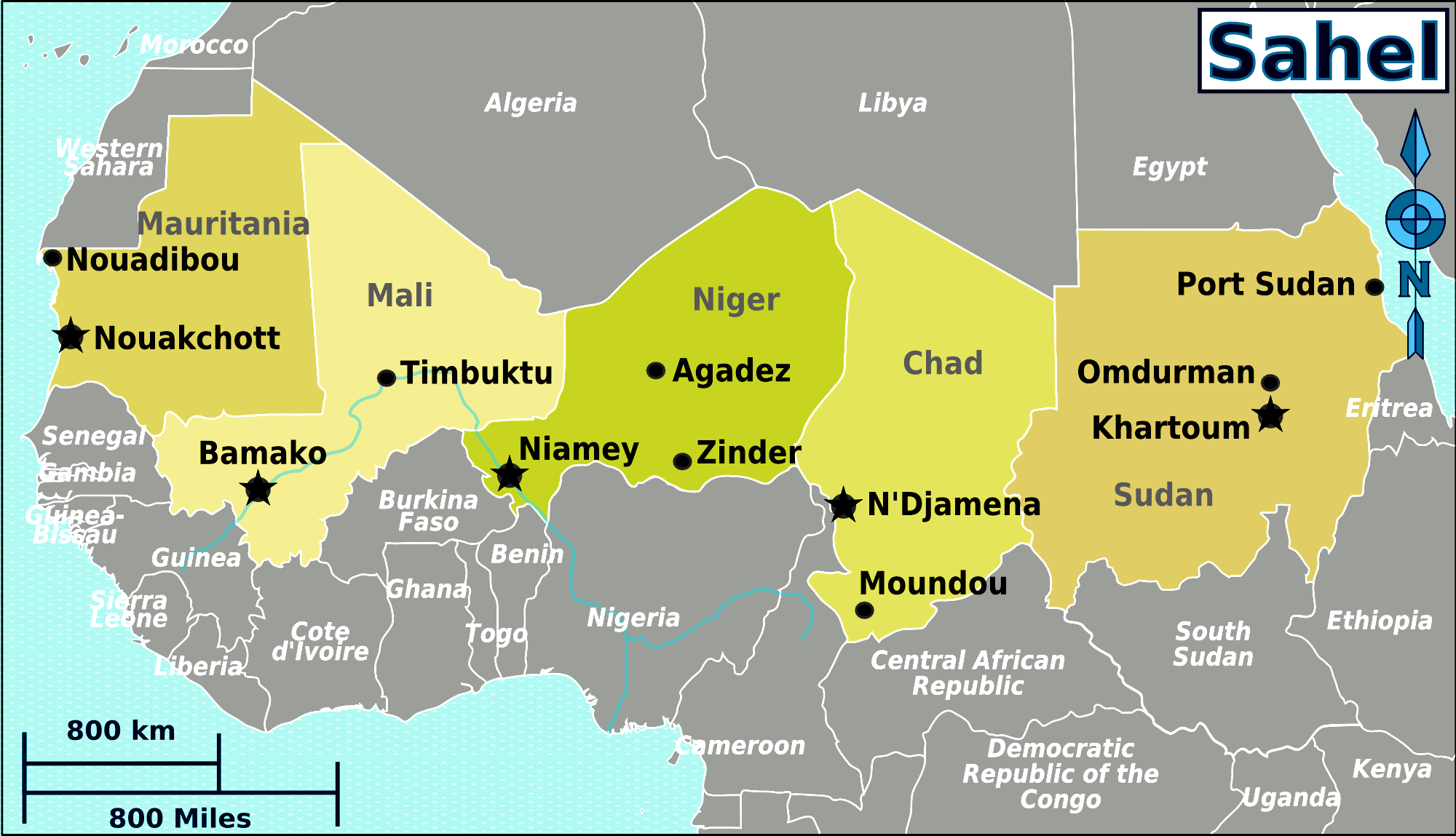


“…it may be a bit too simplistic to say — as a Ghanian news source recently did — that the “Islamic Jihadist groups [now rebelling in Mali, Burkina Faso, and Niger] were initially formed and funded by the imperialist countries to fight against the former Libyan government…during the counter-revolution of 2011,”
It is ineed “too simplistic” to say these jihadis were “initially formed” by the usual suspects; but it is certainly true that they were supported in all sorts of ways, and then funded and armed, and assisted by Special Forces troops from some of those countries. And, of course, when that was not enough, all the propaganda organs of “NGOs” and the establishment press were unleashed against the Libyan government, followed by NATO bombardments.
Wow. That was not easy to read but I made it to the end. I read pretty much every line and I didn’t like much of what it said. If I was an African, I’d be offended. Not sure what to say now. So much effing ignominy it is hard to get your mind wrapped around it, but this article was helpful especially for those of us hoping to move away from 20th century thinking as well the centuries prior. Sometimes bad ideas die slowly, but they always die in the end.
~
All I can say I reckon is thank-you Mr. Sjursen for all of the incredible information you have provided. Holy Moly.
~
Best,
BK